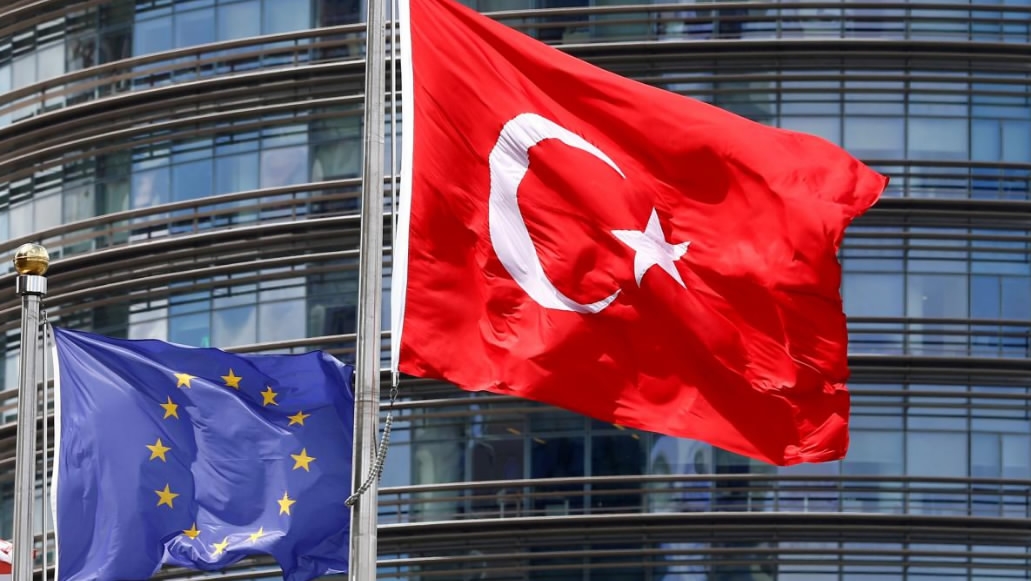Leaders of the European Union (EU) and Turkey will hold a summit on Monday in Varna, Bulgaria, in an effort to "normalize" ties for bilateral relations.
European Council President Donald Tusk and European Commission President Jean-Claude Juncker, as well as Turkish president Recep Tayyip Erdogan will attend the EU summit, where they are expected to discuss economic partnerships, ways to fight terrorism, managing migration, the situation in Syria, and most importantly, Turkey's stalled EU accession.
Turkey's path to EU membership has been long and winding and relations between the two sides have gone through ups and downs over the past decades. Turkey has been knocking at Europe's door since 1959. The process took a big step forward in 2005 when the formal accession negotiation begin, but later reached a stalemate when EU and Turkey were divided on issues over Cyprus and Turkey’s failed coup attempt in 2016.
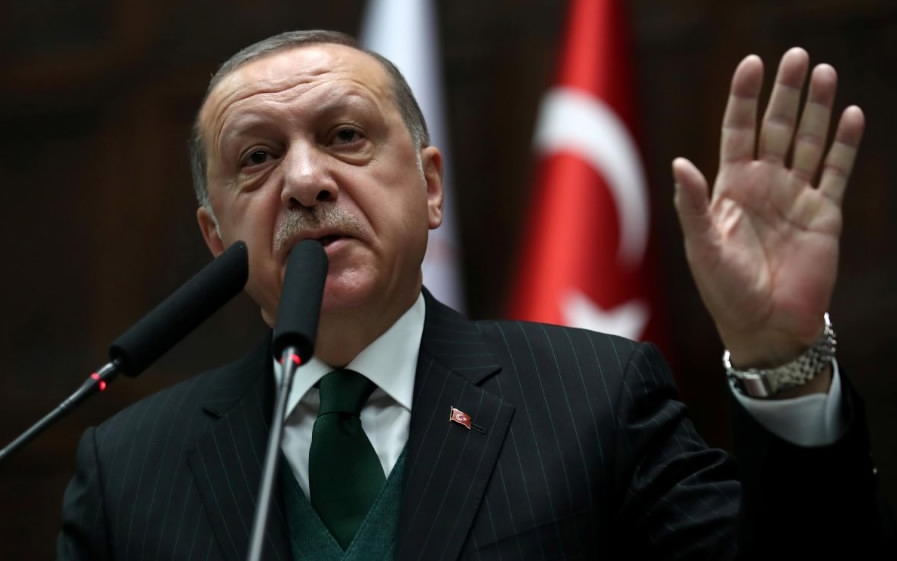
Turkish President Tayyip Erdogan addresses parliament from his ruling AK Party (AKP) in Ankara, Turkey, March 6, 2018. /Reuters Photo
Turkish President Tayyip Erdogan addresses parliament from his ruling AK Party (AKP) in Ankara, Turkey, March 6, 2018. /Reuters Photo
Bilateral relations have been strained after Turkey's 2017 referendum, followed by EU's call for the suspension of accession process. A number of EU government heads, including Germany's Angela Merkel, have also said they would block Turkey’s accession to the union. Now the procedure is effectively frozen.
Privately, however, ministers raise the possibility of a new, looser agreement with Turkey on free trade, immigration and counter-terrorism. The European Union is Turkey’s biggest foreign investor and biggest trading partner.
“I am looking with mixed feelings towards the Varna summit because the differences in views between the EU and Turkey are many,” said European Commission President Jean-Claude Juncker, who will represent the bloc along with European Council President Donald Tusk.
Turkey viewed the summit as “an important opportunity to move our relations forward” and expected “the same positive and constructive approach from the EU.”
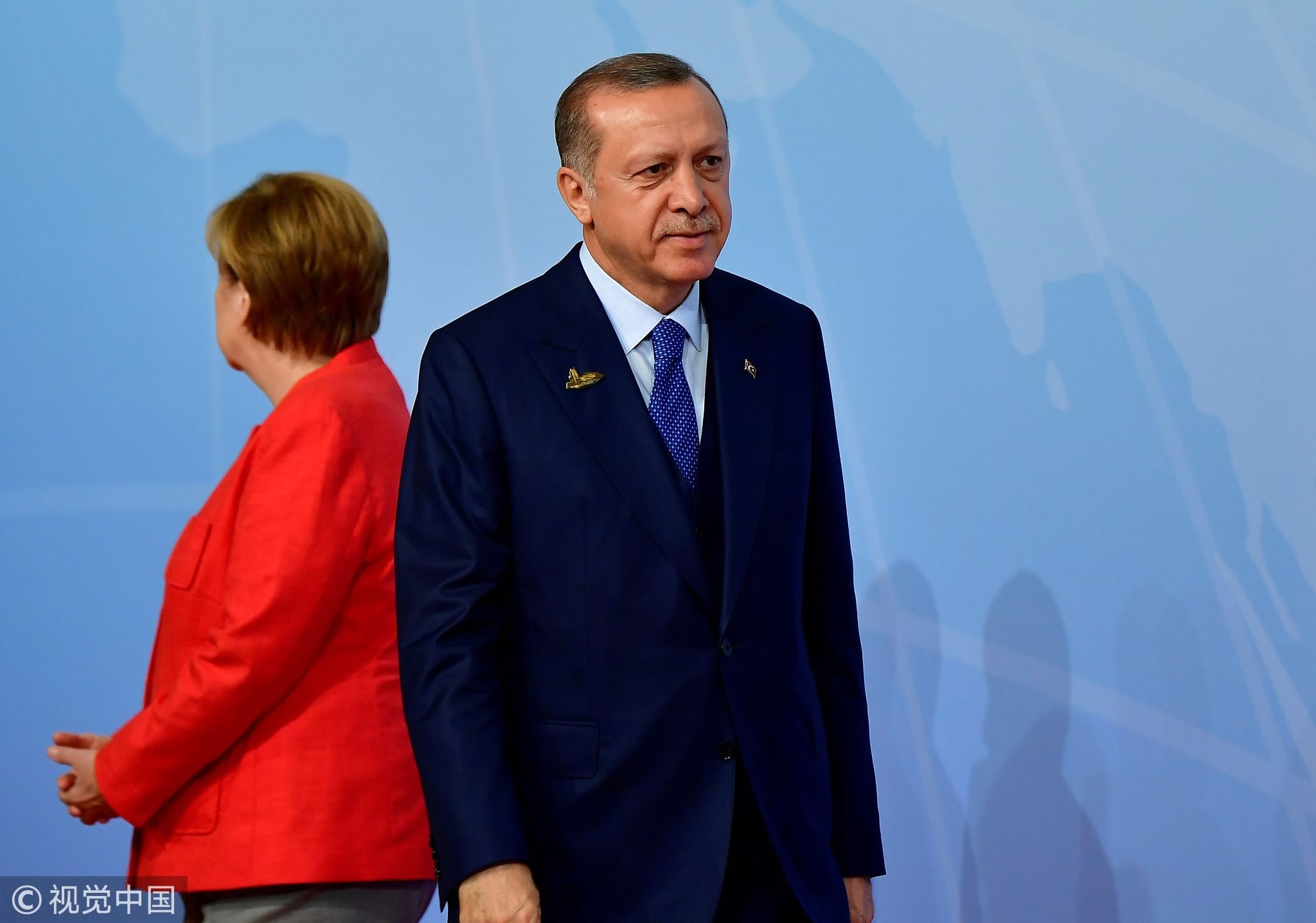
German Chancellor Angela Merkel (L) standing next to Turkey's President Recep Tayyip Erdogan as he arrives to attend the G20 summit in Hamburg, northern Germany, July 7, 2017. /VCG Photo
German Chancellor Angela Merkel (L) standing next to Turkey's President Recep Tayyip Erdogan as he arrives to attend the G20 summit in Hamburg, northern Germany, July 7, 2017. /VCG Photo
Erdogan will seek more money for Syrian refugees, a deeper customs union and progress in talks on letting Turks visit Europe without visas, a Turkish foreign ministry spokesman said.
Experts expect that there will be no big breakthroughs regarding the restart of Turkey's EU progress in the summit, as tensions have further been escalated. Just a week before the summit, the EU criticized Ankara for blocking natural gas exploration off Cyprus.
Here is a timeline of Turkey’s EU accession progress:
1952 - Turkey becomes a member of North Atlantic Treaty Organization (NATO).
1959 - Turkey applies for a membership in the European Economic Community (EEC).
1963 - An association agreement between the EEC and Turkey is signed in Ankara.
1987 - Turkey, a member of the NATO military alliance, applies to join the EU’s forerunner, the European Economic Community.
1997 - Ankara is declared eligible to start talks, after strong support from Britain, Italy and Sweden. They see the addition of a dynamic economy and a powerful player in Middle East politics as a benefit for the EU.
France, Germany and Austria are wary of admitting Turkey, concerned about the economic and cultural challenges of integrating a large, Muslim nation of 80 million people into the EU.
2002 - Turkey abolishes the death penalty, a basic condition for joining the European Union. Turkey’s Islamist-rooted AK Party wins a general election and vows to push for EU membership.
March 2003 - Tayyip Erdogan becomes prime minister and later says that Turkey “is very much ready to be part of the European Union family.”
October 2005 - Formal EU accession negotiations begin.
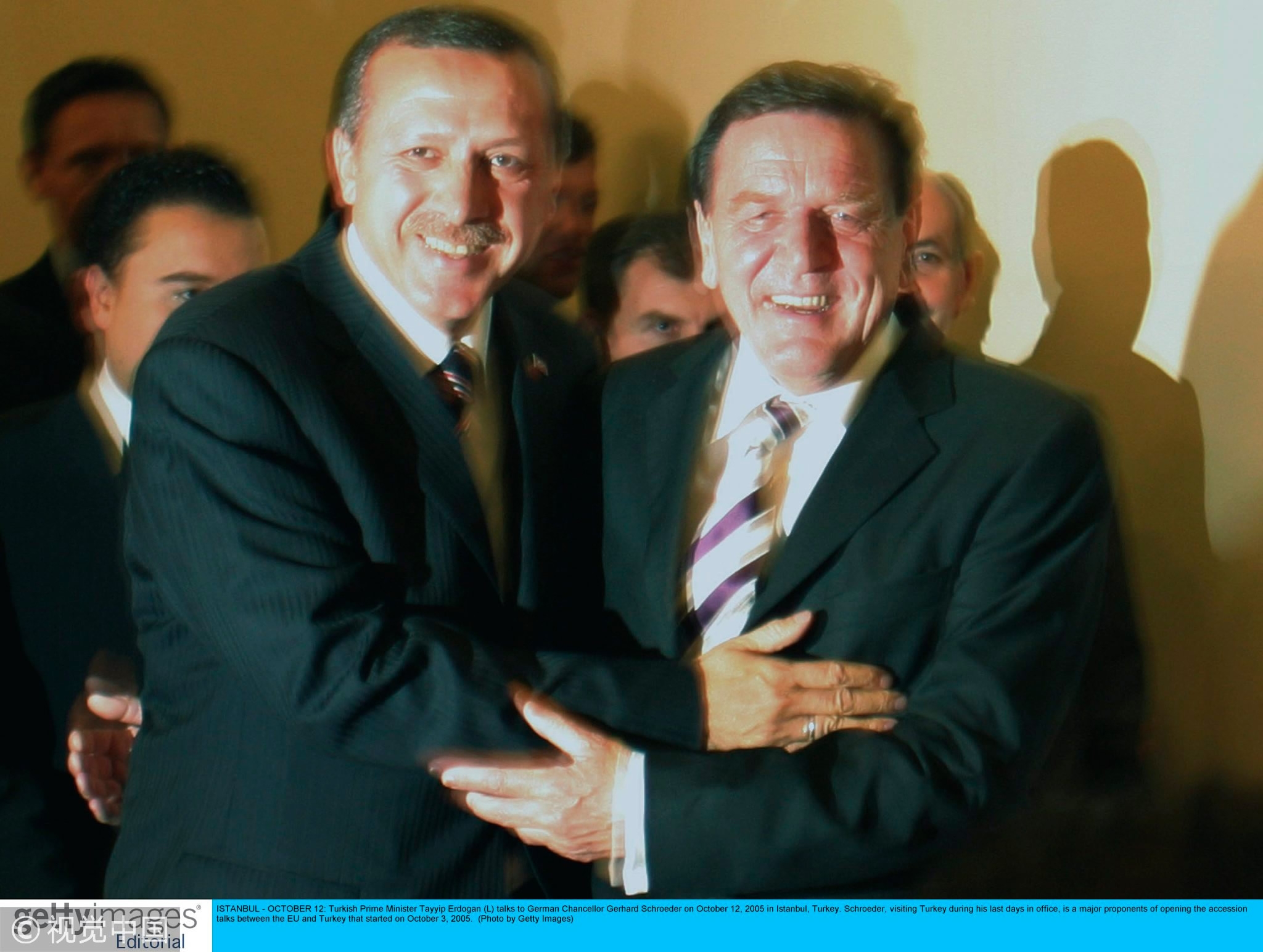
October 12, 2005: Turkish Prime Minister Tayyip Erdogan (L) talks to former German Chancellor Gerhard Schroeder in Istanbul, Turkey. Schroeder, visiting Turkey during his last days in office, is a major proponents of opening the accession talks between the EU and Turkey that started on October 3, 2005. /VCG Photo
October 12, 2005: Turkish Prime Minister Tayyip Erdogan (L) talks to former German Chancellor Gerhard Schroeder in Istanbul, Turkey. Schroeder, visiting Turkey during his last days in office, is a major proponents of opening the accession talks between the EU and Turkey that started on October 3, 2005. /VCG Photo
2010 - Turkey’s membership bid stalls over issues including the divided island of Cyprus, an EU member, which Turkey invaded in 1974. Pushed by Cyprus and France, EU capitals block the opening of new negotiating areas, or chapters.
2013/2014 - Erdogan purges thousands of police and hundreds of judges and prosecutors over a corruption scandal he says was engineered by political enemies.
August 2014 - Erdogan is elected to the post of president which he plans to transform from a largely ceremonial post to a powerful executive office.
October 2014 - The European Commission, the EU executive that oversees EU accession talks, submits its most critical annual report yet, warning of “serious doubts” about judicial independence.
March 2016 - The European Union and Turkey agree to revive accession talks, as well as negotiations over visa-free travel for Turks to the bloc, as part of a broader accord to halt record flows of Syrian refugees to Europe in return for financial aid for Ankara.
July 15, 2016 - A faction of the military tries to overthrow Erdogan, prompting international condemnation, including from the European Union.
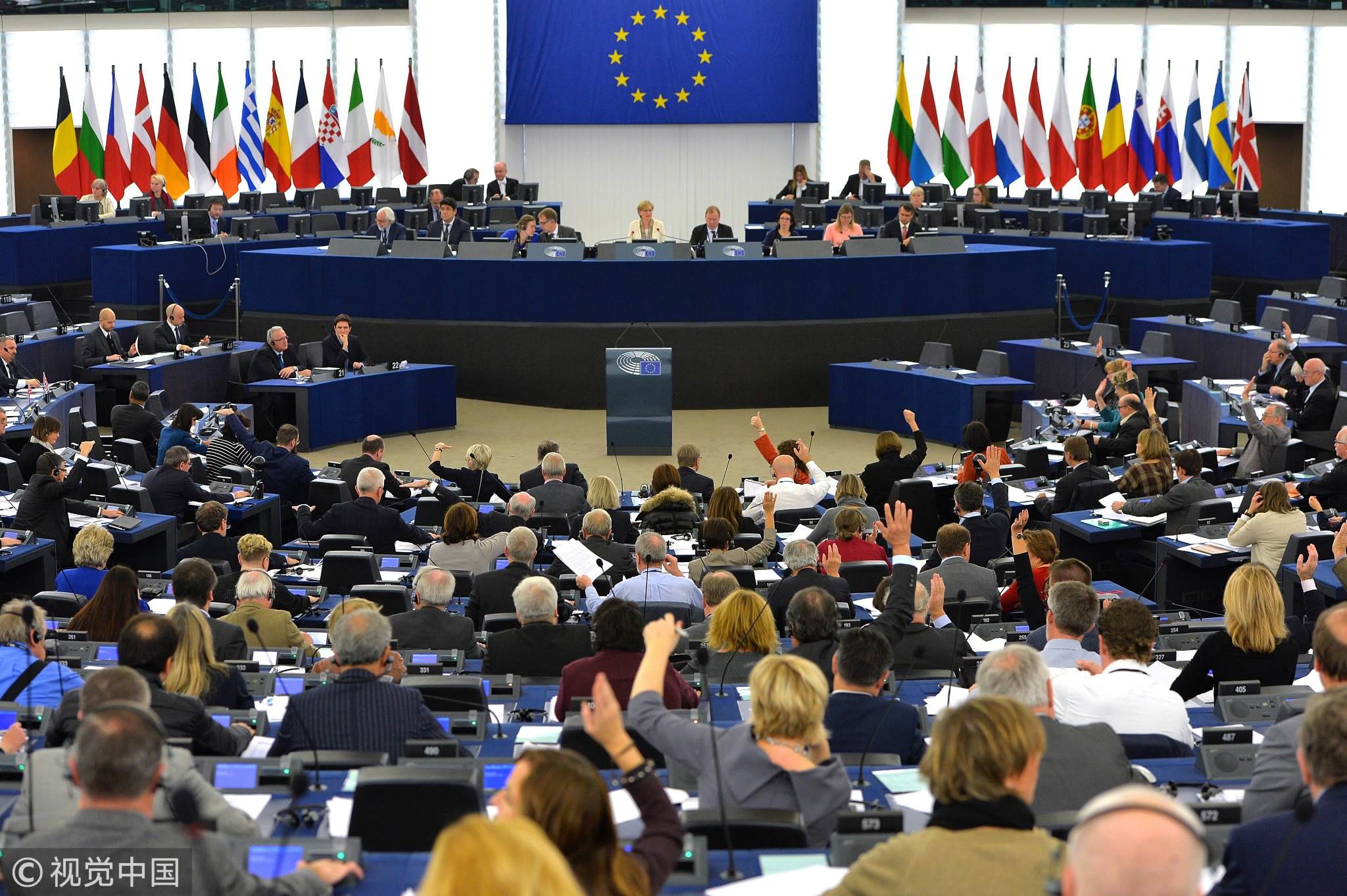
November 24, 2016: The European Parliament adopts a non-binding motion urging the European Commission and national governments to temporarily suspend EU accession talks with Turkey. /VCG Photo
November 24, 2016: The European Parliament adopts a non-binding motion urging the European Commission and national governments to temporarily suspend EU accession talks with Turkey. /VCG Photo
But relations with Brussels quickly begin to sour as Turkey purges suspected coup plotters on a huge scale. The Council of Europe rights body, of which Turkey is a member, says the purge is unconstitutional.
March 2017 - Erdogan accuses Germany of “fascist actions” reminiscent of Nazi times after being stopped from holding political rallies in the country as he seeks support among the 1.5 million Turkish citizens there ahead of an April referendum.
A narrow victory in the referendum gives Erdogan sweeping new powers that the European Union fears cements a new system of authoritarian rule and makes EU membership ever more distant.
April 2017 - The European Parliament calls for a formal suspension of Turkey’s EU membership bid, which is now effectively frozen.
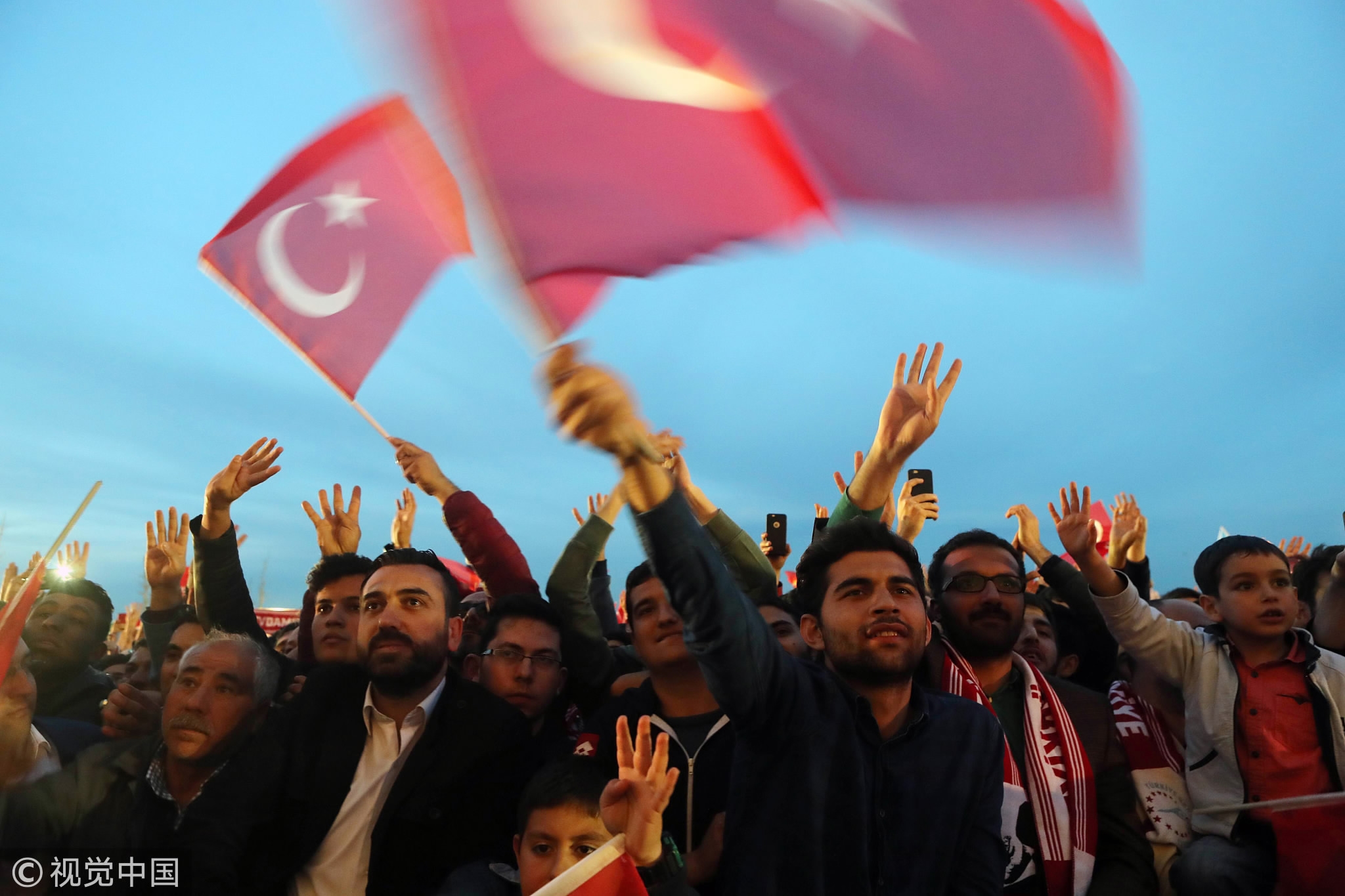
April 17, 2017: Supporters of the "yes" wave Turkish National flags as they cheer Turkish President Recep Tayyip Erdogan during his speech at the Presidential Palace in Ankara, following the results in a nationwide referendum that will determine Turkey's future destiny. /VCG Photo
April 17, 2017: Supporters of the "yes" wave Turkish National flags as they cheer Turkish President Recep Tayyip Erdogan during his speech at the Presidential Palace in Ankara, following the results in a nationwide referendum that will determine Turkey's future destiny. /VCG Photo
EU foreign ministers hold talks with Turkey’s top diplomat Mevlut Cavusoglu in Malta. They say they are against annulling Turkey’s decade-long bid for EU membership.
Sept. 3, 2017 - German Chancellor Angela Merkel says she will seek an end to Turkey’s membership talks, in an apparent shift of position during a televised debate weeks before a German election.
Jan. 8, 2018 - French President Emmanuel Macron calls for an end to the "hypocrisy" of allowing Turkey to become a full member of EU.
(With inputs from Reuters)

